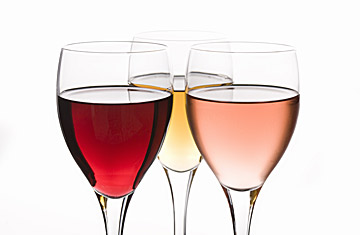
Quelle horreur! French winemakers are apoplectic. The idea is, they say, heresy. If meddling bureaucrats get their way, it could destroy winemaking traditions that have been nurtured over centuries.
The vintners' indignation is directed at European Commission plans to simplify the process of making rosé wine. According to strict French law, rosé winemaking is a complex operation: black grapes are crushed and the skins, pips and pulp left to macerate with the juice for a few hours before being removed. This tints the wine pink, and leaves a light, low-tannin flavor. But under the proposed reforms, winemakers would have the option of simply blending white and red wines to make the pink drink, a practice used in other wine-producing regions such as Australia and California. (See pictures of American wines.)
French winemakers fear that the new rules will allow any producer to mix their surplus whites and reds, flooding the market with cheap, poor-quality rosé. "We are shocked by these plans," says Eric Rosaz, director general of the Association Générale de la Production Viticole, France's winemakers' association. "We have our own traditions in France, and we want to protect them. We want to ensure that French rosé remains a quality product and is recognized as such. But this proposal could force thousands of winemakers out of business."
Outside France, rosé wine is often spurned by wine snobs as a cheap gimmick. But the French treat it with more respect and talk of the delicate harmony between the color, aroma and taste of traditionally made rosé wines. Usually enjoyed as a cool summer drink, it is versatile enough to be drunk at meals, as an aperitif or during soirées. It is also currently enjoying a vogue: rosé has now overtaken white-wine sales in France and accounts for almost 10% of the world market. (See pictures of Paris expanding.)
The planned E.U. reforms are part of a wider overhaul that aims to drain the surplus production in Europe's so-called wine lake and slash some of the E.U.'s $1.8 billion annual subsidies paid to the industry. Commission officials say the new rules could help European wines compete against their New World cousins. "We're importing rosé made by blending, so it's pretty daft that we don't allow it in Europe," says Commission spokesman Michael Mann.
Rosé blending is actually already sanctioned by the Paris-based International Organization of Vine and Wine and — curiously — is an accepted practice in France among a few high-end winemakers: a splash of red wine is the key to making pink champagne.
The Commission insists that the proposed rules would not force winemakers to go down the blending route. Any producers who want to stick with the traditional methods can do so. But French winemakers fret that the rules will bring the entire sector down to the lowest common denominator. Their complaints echo other French wine battles fought over the years. These include ongoing efforts to protect their unique right to use the word champagne and their feud with Australian exporters who use wood chips as a shortcut for oak-barrel aging. (See pictures of how to make whisky.)
It is no coincidence that these bitter arguments come as France is seeing its wine output and sales fall. Italy has now replaced France as the world's largest wine producer. France's 2008 production level was about 1.17 billion gallons (4.44 billion liters), down by a quarter compared with 2005 output. Meanwhile, consumers continue to lap up New World wines.
The French are missing the point, says Val Smith, chairman of the International Wine and Spirit Record, a London-based market-research company. "It's a totally unnecessary fight," he says. "But it is symbolic of the lack of confidence that many French winemakers feel at the moment. They are struggling in the face of competition, and if there is anything they can do to make things difficult for New World wines, they will."
E.U. governments are set to vote on the proposal at the end of April, and officials are scurrying to devise a compromise, probably involving a special label. If Paris can rally enough E.U. countries to its cause, then French winemakers may well win this particular battle. But with their global market share continuing to fall, they might have to look at other ways to win back consumers.
Vote for the 2009 TIME 100 Finalists.
